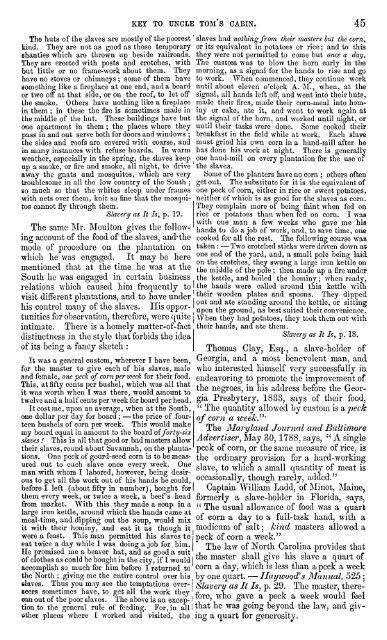UNCLE TOM'S CABIN
1iw97FV
1iw97FV
- No tags were found...
Create successful ePaper yourself
Turn your PDF publications into a flip-book with our unique Google optimized e-Paper software.
the<br />
Two<br />
KEY TO <strong>UNCLE</strong> TOM S <strong>CABIN</strong>.<br />
45<br />
The huts of the slaves are mostlyof the poorestslaveshad<br />
nothing from their ?naste?-sbut the corn,<br />
kind. They are not as good as those temporary<br />
or itsequivalentin potatoes or rice ; and to this<br />
shanties which are thrown up beside railroads. they were not permitted to come but once a day.<br />
They are erected with posts and crotches, with The custom was to blow the horn earlyin the<br />
but little or no frame-work about them. They morning, as a signal for the hands to rise and go<br />
have no stoves or chimneys; some of them have to work. When commenced, theycontinue work<br />
something like a fireplace at one end, and a board until about eleven o'clock A. M., when, at the<br />
or two off at that side, or on the roof, to let off signal, all hands left off,and went into their huts,<br />
the smoke. Others have nothinglike a fireplace made their fires, made their corn-meal into hominy<br />
in them ; in these the fireis sometimes made in<br />
or cake, ate it,and went to work again at<br />
the middle of the hut. These buildingshave but the signal of the horn,and worked until night, or<br />
one apartment in them ; the places where they until their tasks were done. Some cooked their<br />
pass in and out serve both for doors and windows ; breakfast in the fieldwhile at work. Each slave<br />
the sides and roofs are covered with coarse, and must grindhis own corn in a hand-mill after he<br />
mode of procedure on the plantation<br />
which he was engaged. It may be here<br />
intimate. There is a homely matter-of-fact<br />
distinctnessin the stylethatforbidsthe idea<br />
of itsbeing a fancysketch ;<br />
it was a generalcustom, wherever I have been,<br />
for the master to give each of his slaves,male who<br />
in<br />
and female,one -peckof corn per week for their food.<br />
endeavoring<br />
This,at fifty<br />
to promote the improvement of<br />
cents per bushel,which was all that<br />
the<br />
it was worth when I was there,would amount to negroes, in his address beforethe Georgia<br />
twelve and a half cents per week forboard per head. Presbytery,<br />
It cost me, upon an average, when at the "<br />
South, The quantityallowed by custom isa peck<br />
one dollar per day for board "<br />
; priceof fourteen<br />
of cor n a weekP'<br />
bushels of corn per week. This would make<br />
my board The<br />
equalin amount to the board<br />
Maryland Journal and Baltimore<br />
offorty-six<br />
slaves! This is allthat goodor bad masters allow Advertiser,<br />
theirslaves,round about Savannah,on the plantations.<br />
peck of corn, or the same measure of rice, is<br />
One peck of gourd-seed corn is to be measured<br />
for a<br />
out to each slave once<br />
every week. One<br />
man with whom I labored,however,being desirous<br />
to get all the work out of his hands he could,<br />
before 1 left (aboutfifty in number), boughtfor<br />
them every week, or twice a week, a beef's head<br />
from market. With this they made a soup in a<br />
large iron kettle,around which the hands came at<br />
meal-time,and dipping out the of<br />
soup, would mix corn a day to a full-task hand,with a<br />
it with their hominy, and eat it as though it modicum of salt ; kind masters allowed a<br />
were a feast. This man permittedhis slaves to<br />
peckof corn a week."<br />
eat twice a day while I was doing a jobfor him. The law of North Carolina<br />
He promised me a beaver hat,and as<br />
provides<br />
good a suit<br />
of clothes as could be bought in the city, if I would<br />
accomplish so much for him before 1 returned to<br />
the North ; givingme the entire control over his<br />
slaves. Thus you may<br />
see the temptationsoverseers<br />
in many instances with refuse boards. In warm has done his work at night. There is generally<br />
weather,especially in the spring țhe slaves keep one hand-mill on<br />
every plantation for the use of<br />
up a smoke, or fireand smoke, all nightțo drive the slaves.<br />
away the gnats and mosquitos, which are<br />
very Some of the planters have no corn ; others often<br />
troublesome in all the low country of the South ; get out. The substitutefor it is the equivalent of<br />
so much so that the whites sleepunder frames one peck of corn, either in rice or sweet potatoes,<br />
with nets over them, knit so fine that the mosquitos<br />
neither of which is as good for the slaves as corn.<br />
cannot flythrough them.<br />
Theycomplain more of beingfaintwhen fed on<br />
Slavery as It Is, p. 19. rice or potatoes than when fed on corn. I was<br />
The same Mr. Moulton givesthe following<br />
with one man a few weeks who me<br />
gave hia<br />
hands to do a job of work,and,to<br />
account of the food of the slaves, and*the<br />
save time,one<br />
cooked for all the rest. The following course was<br />
taken :<br />
"<br />
crotched sticks were driven down at<br />
one end of the yard,and,a small polebeing laid<br />
on the crotches,they<br />
mentioned that at the time he was at the<br />
swung<br />
a large iron kettle on<br />
the middle of the pole;<br />
South he was engagedin certain business<br />
then made up a fireunder<br />
the kettle,and boiled the hominy; when ready,<br />
relationswhich caused him frequently to the hands were called around this kettle with<br />
visitdifferentplantations, and to have under their wooden plates and spoons. They dipped<br />
out and ate<br />
his control many of the slaves. His standing around the kettle, or sitting<br />
opportunities<br />
upon<br />
forobservation, therefore, were quite<br />
the ground, as best suited their convenience.<br />
When they had potatoes,theytook them out with<br />
theirhands,and ate them.<br />
Slavery Is, p. 18.<br />
Thomas Clay,Esq.,a slave-holder of<br />
Georgia,and a most benevolent man, and<br />
interestedhimself very successfully<br />
1883, says<br />
of their food,<br />
May 30,1788, says,<br />
"<br />
A single<br />
the ordinaryprovision hard-working<br />
slave, to which a small quantity meat is<br />
occasionally, thoughrarely, CaptainWilliam Ladd, of Minot,Maine,<br />
formerly Florida, says,<br />
"<br />
The usual allowance of food was a<br />
quart<br />
that<br />
the master shall give his slavea quart of<br />
corn a day,which isle3S than a peck a week<br />
by one quart." Haywood'sManual. 525 ;<br />
Slavery<br />
sometimes have,to get all the work they<br />
as It Is, p.<br />
29. The master,therefore,<br />
who<br />
ean out of the poor slaves. The above is an gave a<br />
exception<br />
peck a week would feel<br />
to the general rule of feeding.For,in all that he was goingbeyondthe law, and giving<br />
other places where I worked and visited țhe<br />
a quart for generosity.




